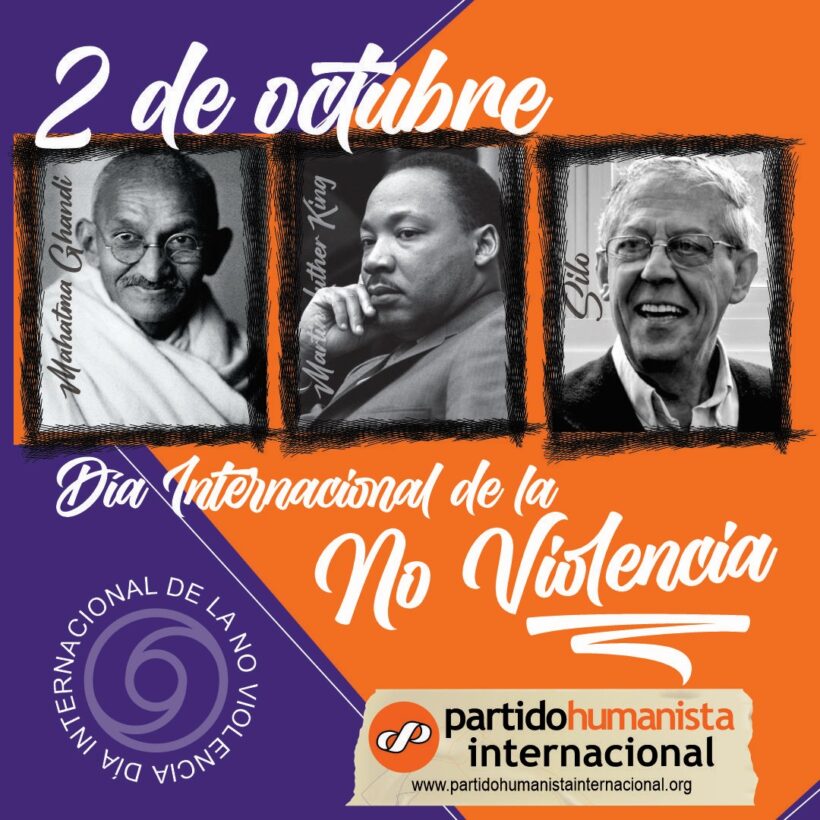Active Nonviolence is the force that will transform the world
On 15 June 2007, a UN resolution established 2 October every year as the International Day of Nonviolence, in recognition of Mahatma Gandhi, who contributed to the world with a powerful voice and determined action in the construction of peace using the methodology of active nonviolence.
The Universalist Humanism that inspires our Federation of Humanist Parties has one of its fundamental ethical and methodological pillars in active nonviolence.
For Universalist Humanism, violence is not natural to human beings (understood as the fact of harming by action or omission, of attacking the freedom and intentionality of others), we understand that violence is a cultural, historical and social fact.
The pillars on which violence is driven are therefore not natural: individualism, discrimination, competition, pragmatism, revenge and contradiction.
Violence is multi-causal and multifaceted. We distinguish between different types of violence: physical, economic, social, ethnic, generational, sexual, psychological, environmental, etc.
Violence is exercised within a scale of values, which has placed money as the central value, in a materialistic culture that puts things above the value of people.
Currently, the main actor driving violence on a global level is the private international financial system, associated with the mass media, the military industrial complex and the transnational corporations that produce goods and services.
In the face of the different forms of violence mentioned above, active nonviolence as a personal attitude and as a methodology of action emerges as an answer to overcome them.
Active nonviolence as a personal attitude means not responding to violence with violence, and includes the right to self-defence as a legitimate component of this attitude.
In the field of social praxis, active nonviolence drives concrete actions to raise consciousness, denounce, protest, resist, disobey and counteract different forms of violence.
Humanists uphold the need to move towards a culture of nonviolence, based on personal freedom, social solidarity and non-tolerance of violence.
Humanists advocate a nonviolent culture that places people at the centre of its values, allowing the construction of a truly humane society where power is in the social whole, overcoming the current violence where a minority imposes violent conditions on the rest.
At this moment in the historical process of humanity, it is time to resolutely promote active nonviolence in order to work for real democracy and a fair distribution of wealth, to eradicate inequality and poverty, to prevent the unbridled depredation of natural resources and to make all human rights a reality.
These essential and urgent causes for human evolution unconditionally need the force, coherence and direction of active nonviolence for the humanising transformation of our world.
As Silo stated in Madrid in 1993: “We will only move from prehistory to true human history when the violent animal appropriation of some human beings by others is eliminated (…) All forms of violence, through which human progress has been blocked, are repugnant to humanists. All forms of overt or covert discrimination are a cause for humanists to denounce”.
The more violence increases in our societies, the more important it is to build nonviolent tools for social and personal action:
- Rejection and void before different forms of discrimination and violence.
- Non-collaboration with violent practices.
- Denouncing all acts of discrimination and violence.
- Civil disobedience in the face of institutionalised violence.
- Social organisation and mobilisation based on voluntary work and the solidarity of those who promote it.
Today, more than ever, the ethical value of active nonviolence as the only real way to solve the great challenges facing humanity is evident, since it is clear that there is no violent solution to the problems: violence is the problem.
Violence can be learned and so can nonviolence.










